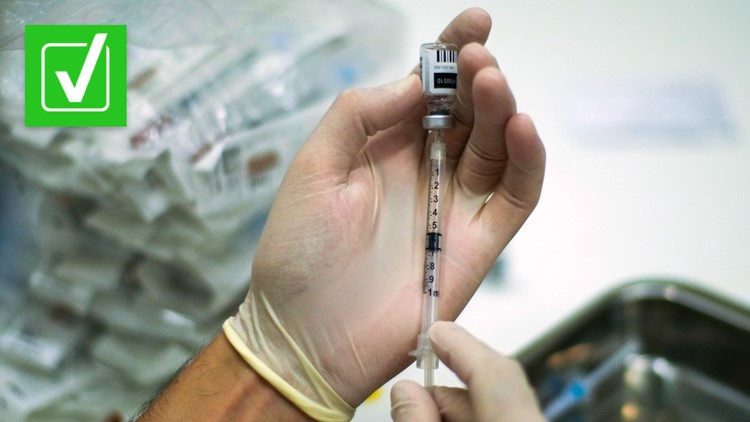On July 23, the World Health Organization (WHO) officially declared the multi-country monkeypox outbreak a public health emergency of international concern. As of July 27, monkeypox has spread to 77 countries and territories, including the United States, and there are currently 20,638 confirmed cases of the virus worldwide, according to Centers for Disease Control and Prevention (CDC) data.
RELATED: 4 Fast Facts about monkeypox
In the U.S., two vaccines, which were originally approved for smallpox, have been licensed by the Food and Drug Administration (FDA) for the prevention of monkeypox infection. Those vaccines are known as ACAM2000 and JYNNEOS. Multiple posts on Twitter (here, here, and here) claim people who have eczema, an inflammatory skin condition that causes itchiness, dry skin, rashes, scaly patches, blisters, and skin infections, should not get at least one of the monkeypox vaccines.
THE QUESTION
Can people with eczema get vaccinated against monkeypox?
THE SOURCES
THE ANSWER
Yes, people with eczema can get vaccinated against monkeypox, provided they are receiving the JYNNEOS vaccine. They should avoid the ACAM2000 vaccine.
WHAT WE FOUND
The Centers for Disease Control and Prevention (CDC) and the National Institute of Allergies and Infectious Diseases (NIAID) say people who have eczema should not get the ACAM2000 vaccine due to safety concerns for people with inflammatory skin conditions. Instead, both public health agencies say the JYNNEOS vaccine is safe for people with eczema and other skin conditions.
While eligibility requirements vary by state, there is currently a greater supply of ACAM2000 vaccines than JYNNEOS available in the U.S. The CDC says more JYNNEOS is expected to be distributed in the coming months.
The difference between the JYNNEOS vaccine and the ACAM2000 vaccine is the type of virus they use. The JYNNEOS uses a weakened form of live virus that doesn't replicate, while the weakened live virus used in ACAM2000 can replicate. That replication is what can cause severe side effects in people with weakened immune systems and skin conditions such as eczema, according to NIAID.
“ACAM2000 is administered as a live Vaccinia virus preparation. The virus grows at the site of this inoculation. However, since it is a live virus, it can spread to other parts of the body or even to other people. This is a particular risk for people with inflammatory skin conditions,” Matthew M. Hamill, Ph.D., assistant professor of medicine at Johns Hopkins Medicine, told VERIFY.
“JYNNEOS is a live virus that is non-replicating so [it] can’t grow and spread within a person’s skin or other parts of the body,” Hamill explained.
In late June, the U.S. Department of Health & Human Services (HHS) announced an enhanced national strategy “to vaccinate and protect at-risk individuals from monkeypox infections by prioritizing JYNNEOS in areas with the highest number of cases.” As of July 22, 310,385 doses of the JYNNEOS vaccine had been distributed from the Strategic National Stockpile, according to HHS’ Administration for Strategic Preparedness and Response (ASPR).
On July 1, HHS said it had ordered an additional 2.5 million doses of JYNNEOS, which are expected to bring the federal government’s available supply to more than 6.9 million doses by mid-2023, according to the ASPR. The FDA also announced it has approved a supplement to the biologics license for the JYNNEOS vaccine to allow for additional manufacturing capabilities at one of the plants where the vaccine is made.
There are more than 100 million doses of the ACAM2000 vaccine available in the SNS. Communities at high risk of monkeypox transmission may also request shipments of ACAM2000, but HHS says it is not recommended for everyone due to significant side effects. As of July 1, more than 800 doses of ACAM2000 had been distributed to combat the current monkeypox outbreak.
The JYNNEOS vaccine is administered in two doses and is recommended for individuals 18 and older that are at high risk for monkeypox. On its website, the CDC has a list of current eligibility for the JYNNEOS vaccine:
- Known contacts who are identified by public health via case investigation, contact tracing, and risk exposure assessments
- Presumed contacts who may meet the following criteria:
Know that a sexual partner in the past 14 days was diagnosed with monkeypox
Had multiple sexual partners in the past 14 days in a jurisdiction with known monkeypox
Some states have expanded their monkeypox vaccine eligibility criteria beyond what the CDC has recommended. If you have questions about your state’s vaccine eligibility criteria, contact your local health department.



